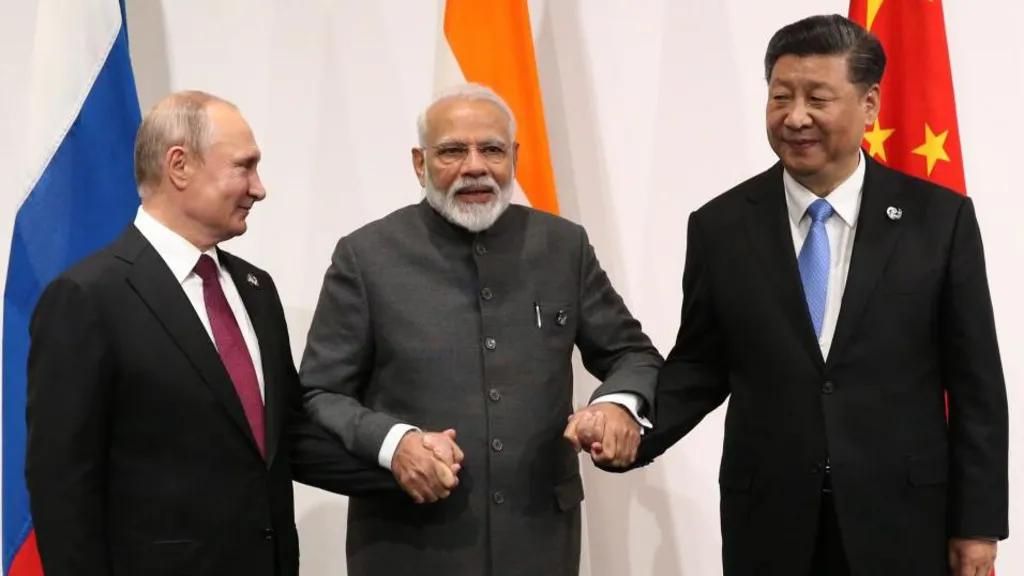As BRICS (Brazil, Russia, India, China, South Africa) gains influence on the world stage, India finds itself in a unique position. The recent summit in Russia gathered top leaders from 36 countries, including the UN Secretary-General, and marked a major moment for BRICS. With four new members—Egypt, Ethiopia, Iran, and the UAE—joining the group, BRICS continues to grow, positioning itself as an alternative to Western-led global governance. But where does India stand? How does it balance its role in BRICS with its ties to the West?

The Evolution of BRICS and India’s Role
Historically, BRICS has faced skepticism from the West. However, the recent summit showed how much BRICS has grown, as it attracts those discontented with Western policies. As one of the original members, India has been central to this journey. Interestingly, India is often seen as the most Western-aligned member, yet it benefits greatly from BRICS’ expansion.
India has strong ties with new BRICS members, like Egypt and the UAE, which are important trade and security partners. Ethiopia also has a long-standing relationship with India, further boosting India’s influence within BRICS. These connections give India significant leverage to shape BRICS’ direction in ways that align with its own interests.
Strategic Autonomy: India’s Guiding Principle
A core element of India’s foreign policy is strategic autonomy—maintaining balanced relationships without formal alliances. This approach helps India work with both Western and non-Western powers. Within BRICS, India can affirm its support for close allies like Russia without compromising its relations with the United States and other Western allies.
For example, BRICS provides India a platform to foster ties with Russia and China. Even with tensions on the India-China border, BRICS allows India to engage in cautious dialogue with Beijing, seen recently through an agreement on border patrolling. This platform enables India to work with rivals and ease tensions when needed.
Shared Priorities Between India and BRICS
At its core, BRICS’ goals align closely with India’s own. Both emphasize multilateralism, outreach to the Global South, and UN reform. India, for instance, seeks a permanent seat on the UN Security Council, a goal supported by BRICS as it challenges Western-dominated structures.
The joint statement from the summit highlighted these shared priorities, such as support for multipolarity and criticism of Western sanctions, which impact India’s trade with Russia and projects with Iran. This alignment strengthens India’s position within BRICS, helping it achieve key goals without risking Western alliances.
BRICS: Not an Anti-Western Group
Though BRICS has expanded and sometimes voices anti-Western sentiments, it is not a direct threat to the West. Many members, like the UAE, maintain close ties to the West. Potential future members, such as Turkey and Vietnam, are also important Western partners. India itself shares strong bonds with the U.S. and Western allies, actively participating in the Indo-Pacific Quad alongside these relationships.
Despite recent expansion, BRICS faces challenges in achieving unity. Initiatives like creating an international payment system to counter the U.S. dollar are ambitious yet challenging due to the differing economic needs of members. Additionally, some BRICS members don’t get along well; for example, Iran has strained relations with both Egypt and the UAE.
The Future of BRICS and India’s Role
India has much to gain from BRICS’ recent expansion, yet it carefully balances these ties with Western alliances. The future focus of BRICS will likely be on common priorities like climate change, public health, and technology. These initiatives align with India’s goals without opposing Western interests.
As BRICS grows, India’s balancing act will become even more crucial. By working within BRICS and maintaining strong Western ties, India can position itself as a central player in a multipolar world.
LifeBahn’s Perspective: The Power of Balance in a Changing World
At LifeBahn, we believe collaboration and balanced diplomacy are essential for global stability. India’s approach to balancing its role in BRICS with Western alliances shows this philosophy in action. As BRICS evolves, India serves as an example of how nations can engage with diverse partners while protecting their core values.
The Intellectual Revolution of 2024 (IR2024) reminds us of the importance of strategic autonomy and adaptability in today’s interconnected world. As countries like India navigate complex relationships, they showcase how collaboration with multiple partners helps achieve prosperity and peace.
Conclusion: A Model of Diplomacy
India’s role in BRICS is a testament to the power of balanced diplomacy. By aligning with both Western and non-Western partners, India shows that maintaining strategic autonomy is possible while contributing to a multipolar world.
Join the Conversation
What are your thoughts on India’s role in BRICS and its balancing act with the West? Share your insights with us at LifeBahn.
Try LifeBahn’s ‘a lifetime of education in 52 weeks “ or
GREAT@ (Globally Relevant Education And Training} Academy, an education continuum, helping to make a better life for our families and our future generations.
Or share your thoughts and ideas in the LifeBahn blog.
Our path to Prosperity.
Autobahn — Road for Automobiles.
LifeBahn —- Road for life. Built on the simple principle.
While competition is a good way to succeed for a FEW,
collaboration is a BETTER way to succeed for MANY.
Please participate and become part of the solution.
Thank you






